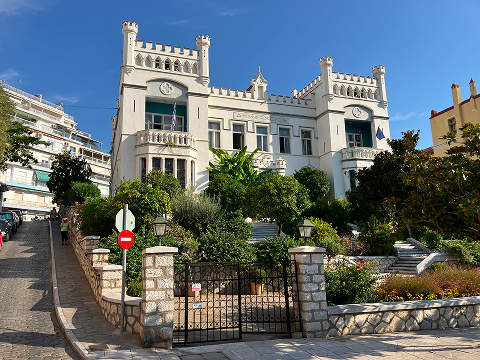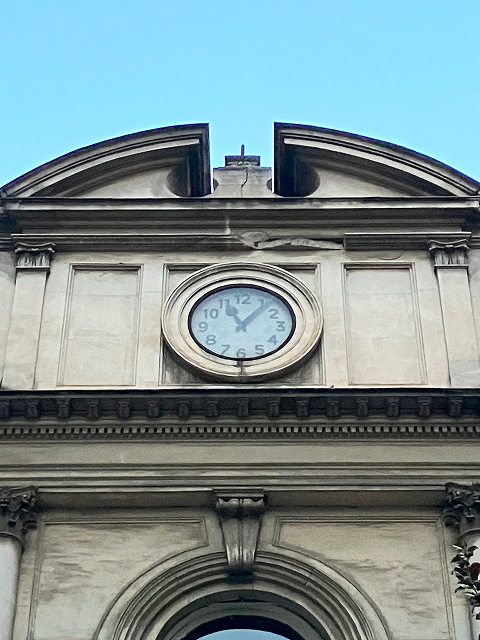2024 Greece
1 Attendance Report for the Summer School 2024 (Greece)
September 25, 2024
Japan Society for the Promotion of Science Research Fellow CPD
From late August to early September 2024, I participated in a summer school held in Greece following on from the summer school held in Germany. First, I attended an international summer school in Kavala, and then visited reconciliation-related institutions and historical sites in Xanthi, Thessaloniki, and Athens.
The Kavala International Summer School was held on the topic of the Cyprus issue, covering international relations, reconciliation studies, and diplomacy. To be honest, I got a very negative impression of the Kavala Summer School itself, because many of the speakers only discussed the Cyprus issue from a one-sided perspective, and there were many presentations that were far from the approach of Reconciliation Studies, despite the fact that Reconciliation Studies was being promoted. When I visited the University of Jena, Dr. Laura Villanueva of the Jena Center for Reconciliation Studies (JCRS) told us that the most important thing in reconciliation efforts is to sincerely listen to the ideas of each actor. However, it seemed that in many of the presentations at the Kavala International Summer School, the views of Greece, the Greeks and Greek Cypriots were seen as the only “legitimate” ones, while the views of Turkey and Turkish Cypriots were seen as “unjust” and not worthy of consideration. Although the word “reconciliation” was used, many speakers expressed the view that it was the Turkish government that was preventing reconciliation. The word “reconciliation” they used only meant the solution that the Greek side wanted, and was totally different from the true meaning of the word. It is impossible to have an academic discussion in such a place. A Greek student participant said that the summer school is nothing but a “propaganda event”, and expressed the feeling that the student was ashamed that such an event to spread this kind of propaganda was held in this country. Another participant also analyzed the Summer School, saying that it was nothing more than “marketing by the Greek Ministry of Foreign Affairs”. Many other participants expressed similar views. I was relieved to learn that the majority of the participants, except for the speakers, had a negative impression of the event.
While many of the presentations from the Greek side were rather one-sided, the presentations from the University of Jena and Japan were more academic and seemed to be well received by many of the participants. For example, the Greek participant who criticized the Summer School as a “propaganda event” seemed to be impressed by the presentation on imperialism by Professor Naoyuki Umemori of Waseda University and the presentation on the comfort women issue by Professor Naoko Kumagai of Aoyama Gakuin University, saying that “we Greek participants working on the Cyprus issue should learn from the attitude of the Japanese speakers, who try to discuss Japan’s past problems from an academic perspective”. Dr. Charalampos Babis Karpouchtsis, a graduate of the University of Jena and currently affiliated with the Helmut Schmidt University in Hamburg, also gave a presentation that was more academic. His presentation style also emphasized interaction with the participants, and was very different from the other speakers who spoke at length and told their stories in a one-sided way to the audience.
Although the Summer School in Kavala itself left me with a negative impression due to the political intentions of the organizers, there were many things I learned from my stay in the city. As specializing in contemporary history, I was particularly interested in how Kavala played a historical role in the region and the world. From the exhibits at the Kavala Municipality Tobacco Museum, which I visited in between the summer school sessions, and the explanations on the information boards set up at the sites of some of the former tobacco warehouses that remain in the city, I learned about tobacco cultivation in the southern Balkans, as well as the manufacturing and export industry in Kavala, and I was also able to see the transformation of the world’s economy in the 20th century through the history of the decline of the city’s tobacco industry. At the Muhammad Ali Museum, I learned about the impact of global historical trends in the region from the second half of the 18th century to the first half of the 19th century through the life of Ali, who was born in the city and later became the governor of Egypt and founded his dynasty. Both of these experiences allowed me to learn about the world through the lens of a particular region, and this gave me a new challenge in my research: how to depict world historical trends through the lens of my specialty, the history of Lithuania.

After the summer school, I visited Xanthi, a city known for its multi-religious coexistence of Muslims and Christians, and met with an imam at a mosque. Unfortunately, it was a short visit, so we did not hear much, but I learned a lot from talking with Muslim students. I heard that this tour was made possible by the initiative of the Muslim students, and I was grateful to them for giving us this opportunity. The organizer of the Summer School also visited Xanthi, but he did not accompany us on the tour of the mosque. I do not know the reason why he did not go to the mosque with us, but I was very disappointed that he did not try to be respectful to the students who had organized this tour.
In Thessaloniki, I had the opportunity to give a presentation at the American College of Thessaloniki (ACT). I gave a presentation on the issues of victimhood nationalism, historical memory and national security in Central and Eastern Europe. Later, in relation to the significance of transitional justice initiatives in Central and Eastern Europe after the regime change and the problem of victim nationalism, I was asked about who and how victims are identified. In this regard, I believe that while the individual victims are recognized through historical research, it is necessary to consider individual memories separately from the victimhood nationalism, or collective memory as victims.
In Thessaloniki, we were able to visit several museums and historical sites related to reconciliation studies. Thessaloniki is one of the core cities in the Southern Balkans, and it has a multi-ethnic and multi-religious history. Even today, it seems that the city seems to be an important hub for people from neighboring countries, as ACT’s participants in the Kavala Summer School included students from North Macedonia and Albania. Although Thessaloniki has historically had a large Jewish population, more than 50,000 people were affected by a major fire in 1917, and during World War II, more than 90% of the city’s Jewish population was expelled or killed in the Holocaust, leaving just over 1,000 Jews living in the city today. Still, I was able to see many Jewish heritage sites in the city. Unfortunately, since we stayed in Thessaloniki for a very short time, I was not able to visit the Holocaust Museum and other important institutions that are a must see in Thessaloniki, and I feel that many of the other participants were also not able to see many of the traces of the city’s history of multiethnic coexistence. For example, the hotel we stayed in was run by Jews, the restaurant served kosher food, and there was a synagogue in the hotel, but I do not think any of the participants noticed this. Instead of going to Athens and visiting tourist sites like the Acropolis and the Pantheon, it would have been more beneficial for us to stay in Thessaloniki for even one more day and learn more about the history of the city. I also feel that we would have learned a lot more by reading academic books about the history of Thessaloniki and the ethnic relations in the city than by reading a business book about negotiation techniques, which was a preliminary assignment for the summer school. I feel that I still have a lot of things to do in Thessaloniki, so I hope to visit the city again soon and gain more insight into the history of the southern Balkans.


